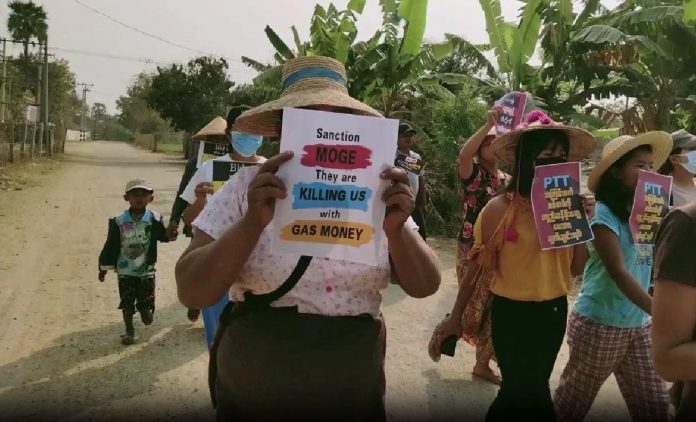Guest contributor
James Shwe
The BURMA Act (Burma Unified through Rigorous Military Accountability Act) was passed by the U.S. Congress in its 2023 National Defense Authorization Act (NDAA). It raised high expectations among the people of Myanmar. Perceiving the act as anti-China, Beijing increased its diplomatic engagement with the military in Naypyidaw. And Chinese Special Envoy Deng Xijun met with seven Ethnic Armed Organizations (EAOs) a week after its passage.
Beijing hoped to fracture the EAOs support for the National Unity Government (NUG), but the ongoing “Operation 1027” launched by the Brotherhood Alliance, a tripartite alliance of EAOs based along the China-Myanmar border, on Oct. 27 suggests that this is beyond Beijing’s capacity.
To quell false expectations, a number of U.S. experts on Myanmar published reality check articles, highlighting the following key points: The U.S. government is divided by design and it operates slowly. It took two years to pass the BURMA Act, and funding for its implementation is still pending Congress’ approval. Even when funded, the U.S. State Department may not implement it in the most effective manner.
Most U.S. assistance will come in the form of humanitarian aid, including non-lethal assistance like medical aid for combat injuries. Direct support for the NUG is unlikely, as it will only go to long-standing USAID partners, including the U.N.
The U.S. government will prioritize its relationships with allies in the region, U.S. business interests, and humanitarian aid over Myanmar’s resistance movement, due to geostrategic concerns such as the need to work with Thailand and India to counter the rise of China.
Despite these limitations, the Myanmar diaspora and its supporters can still reach out to Congress and advocate for the following: Efficient and effective humanitarian aid. The people of Myanmar are facing a severe humanitarian crisis, with millions in need of food, shelter, and medical care. Congress can influence the State Department to ensure that the U.S. provides timely and efficient humanitarian assistance to the people.
The NUG should play a more substantial role in the allocation and distribution of humanitarian aid. Congress can work with the Biden administration to ensure the NUG participation in humanitarian relief efforts.
Effective implementation of the BURMA Act is necessary. It is a powerful tool for holding the Myanmar military accountable for its human rights abuses and crimes. Congress must ensure its effective implementation, including through frequent Congressional hearings to monitor its execution and identify areas for improvement.
A locally-led humanitarian response is needed. The people of Myanmar are best positioned to address the humanitarian crisis in their homeland. Congress can support locally-led humanitarian organizations, including cross-border aid agencies coordinating with the NUG and its allied Ethnic Resistance Organizations (EROs).
The enforcement of sanctions is important. The U.S. and its allies have imposed sanctions on the Myanmar military, including against Myanma Oil and Gas Enterprise (MOG) but its effectiveness depends on full and effective enforcement. Congress can work with the Biden administration and regional partners to ensure that these sanctions are enforced effectively.
Clear communication channels with the NUG and EROs is needed. This will avoid confusion and improve coordination. Congress can work with the NUG to establish clear communication channels between it and the U.S. government. This will facilitate prompt and efficient support from the U.S. government to the NUG.
A clarification of the roles of the NUG, the Committee Representing Pyidaungsu Hluttaw (CRPH), and the National Unity Consultative Council (NUCC) is needed now. There is a need to clarify the distinct roles of the NUG, the CRPH, and the NUCC to the public and to Congress. Congressional support in this endeavor will reduce confusion and enhance coordination.
Facilitation of NUG and EROs coordination is the most effective step. Facilitating more effective communication and coordination between the NUG and EROs would be a significant step towards formulating a concrete plan for achieving federal democracy in Myanmar. Congressional collaboration with the Biden administration can make this a reality.
The Myanmar diaspora in the U.S. is currently campaigning to reconcile the $71 million USD discrepancy in the appropriations for the BURMA Act between the Senate and the House of Representatives for the 2024 financial year. This campaign is progressing well and is expected to be successful, as the Senate and the majority of the House have expressed support.
The recent U.S. sanctions on Myanma Oil and Gas Enterprises (MOGE) were imposed after two-and-a-half years of campaigning by the Myanmar diaspora and its supporters. Experts said that this is as good as full sanctions, as it will disrupt or seriously reduce the amount of foreign revenue to the military.
These grassroots advocacy efforts by the Myanmar diaspora have demonstrated substantial results. It is imperative that the Myanmar diaspora mobilize further and advocate to the U.S. Congress for the effective and timely implementation of the BURMA Act.
James Shwe is a Burmese-American living in the U.S. He has actively championed Myanmar’s democracy movement following the 2021 military coup. He advocates on behalf of both the U.S. government and the National Unity Government (NUG).
DVB publishes a diversity of opinions that does not reflect DVB editorial policy. We’d like to hear what you think about this or any of our stories: [email protected]



